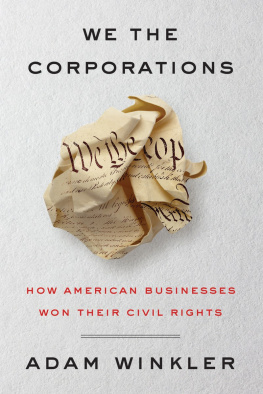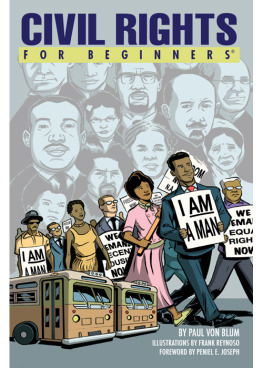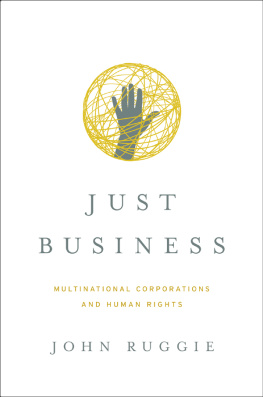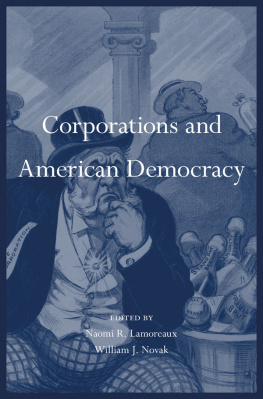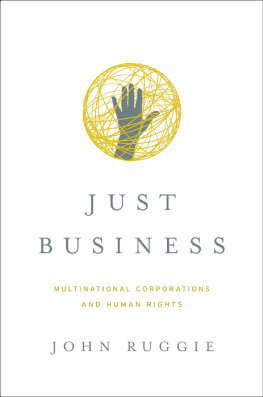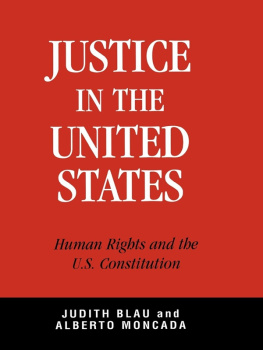WE THE
CORPORATIONS
HOW AMERICAN BUSINESSES
WON THEIR CIVIL RIGHTS
ADAM WINKLER

LIVERIGHT PUBLISHING CORPORATION
A Division of W. W. Norton & Company
INDEPENDENT PUBLISHERS SINCE 1923
New York London
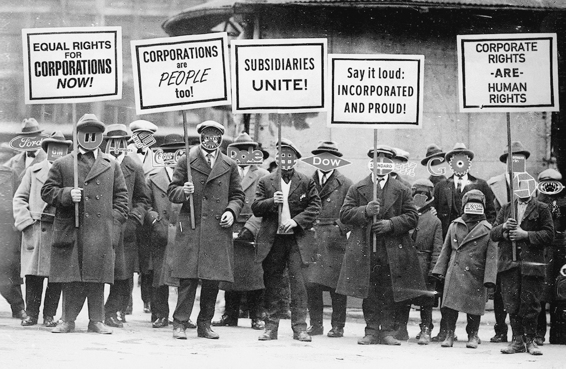
To Margo and Irwin Winkler
for their generous love, infinite support,
and enduring inspiration

STATUE OF ROSCOE CONKLING, FRAMER OF THE FOURTEENTH AMENDMENT AND ATTORNEY FOR THE SOUTHERN PACIFIC RAILROAD, IN NEW YORKS MADISON SQUARE PARK.
I N DECEMBER 1882, ROSCOE CONKLING, A FORMER SENATOR and close confidant of President Chester Arthur, appeared before the justices of the Supreme Court of the United States to argue that corporations like his client, the Southern Pacific Railroad Company, were entitled to equal rights under the Fourteenth Amendment. Although that provision of the Constitution said that no state shall deprive any person of life, liberty, or property, without due process of law or deny to any person within its jurisdiction the equal protection of the laws, Conkling insisted the amendments drafters intended to cover business corporations too. Laws that referred to persons have by long and constant acceptance... been held to embrace artificial persons as well as natural persons, Conkling explained. This long-standing practice was well known to the men who framed, the Congress which proposed, and the people who through their Legislatures ratified the Fourteenth Amendment.
Conklings claim was remarkable. The Fourteenth Amendment had been adopted after the Civil War to guarantee the rights of the freed slaves, not to protect corporations. Conkling, however, had unusual credibility with the justices. For two decades, he had been the leader of the Republican Party in Congress and was often said to be the most powerful man in Washington. He had twice been nominated to the Supreme Court himself, most recently in the spring of the same year he appeared on behalf of the Southern Pacific Railroad. The Senate voted to confirm him but he declined the position, citing poverty from his career in public servicebecoming the last person to turn down a seat on the Supreme Court after having been confirmed. More than most lawyers then, Conkling was considered by the justices to be their peer. And when it came to the history surrounding the drafting of the Fourteenth Amendment, Conklings expertise was unparalleled. As a member of Congress during Reconstruction, Conkling had been on the very committee that wrote the amendment. If anyone could testify to the intent of the Fourteenth Amendments drafters, it was Conkling, who was one himself.
To back up his improbable story, Conkling produced a musty, never-before-published journal that purported to detail his committees deliberations. A close look at the journal, Conkling suggested, would show that while the nation was focused on the rights of the freedmen, he and the other members of Congress had also been worried about laws that unduly burdened business. It was for this very reason that the Fourteenth Amendment used the word person. An early draft of the amendment had guaranteed the rights of citizens, Conkling said, but the language was later changed specifically to include corporations, which were often deemed by the law to be persons for various purposes. As a result, Conkling argued, the Fourteenth Amendment guaranteed the Southern Pacific Railroad the same rights of equal protection and due process as the former slaves.
There was just one small problem with Conklings account of the drafting of the Fourteenth Amendment: it was not true. The drafters of the Fourteenth Amendment did not try to secret into the Constitution broad new protections for corporations, nor was the wording of the amendment ever altered in the way Conkling suggested. As we will see, one of the preeminent figures in American politics had attempted to deceive the justices of the Supreme Court in an effort to win constitutional protections for the Southern Pacific Railroad.
Although a procedural snafu prevented the Supreme Court from issuing a final ruling in Conklings case, the justices soon after embraced Conklings argument that corporations had rights protected by the Fourteenth Amendment. In the years that followed, the Supreme Court would invoke those corporate rights to invalidate numerous laws governing how businesses were to be run, supervised, and taxed. Between 1868, when the amendment was ratified, and 1912, when a scholar set out to identify every Fourteenth Amendment case heard by the Supreme Court, the justices decided 28 cases dealing with the rights of African Americansand an astonishing 312 cases dealing with the rights of corporations. At the same time the court was upholding Jim Crow laws in infamous cases like Plessy v. Ferguson (1896), the justices were invalidating minimum-wage laws, curtailing collective bargaining efforts, voiding manufacturing restrictions, and even overturning a law regulating the weight of commercial loaves of bread. The Fourteenth Amendment, adopted to shield the former slaves from discrimination, had been transformed into a sword used by corporations to strike at unwanted regulation.
* * *
WE THE PEOPLE. Revered by so many, those three words that begin the Constitution have also been criticized for being inaccurate. When the Constitution went into effect in 1789, African Americans were enslaved in eleven states, and women were not allowed to vote in any. The Framers used the phrase We the People to identify who was responsible for enacting this charter of liberty and self-government, but their description was misleading. More than half the nations population was prohibited from participating in the process by which the Constitution was adopted; most were also denied many of the rights the Constitution purported to guarantee. For those left out, the phrase was not a description but an aspiration, and American history has often pivoted around their struggles to gain equal rights, their fight to finally take their rightful place among We the People.
While the civil rights movements for women, racial minorities, and other oppressed groups have been thoroughly studied, there has been another centuries-long push for equal rights that has remained largely unnoticed: the corporate rights movement. Roscoe Conklings case was neither the first nor the last time corporations asked the Supreme Court to recognize their constitutional rights. Despite the fact that corporations have never been subjected to systemic oppression like women and minorities, they too have pushed to gain constitutional protections since Americas earliest days. Indeed, today corporations have nearly all the same rights as individuals: freedom of speech, freedom of the press, religious liberty, due process, equal protection, freedom from unreasonable searches and seizures, the right to counsel, the right against double jeopardy, and the right to trial by jury, among others. Corporations do not have every right guaranteed by the Constitution; they have no right to vote or right against self-incrimination, and none to date has gone to court asserting a right to keep and bear arms. Yet corporations have won a considerable share of the Constitutions most fundamental protections. Corporations, too, have fought to become part of We the People.
In the past decade, the issue of constitutional rights for corporations was thrust into the public spotlight by the Supreme Courts controversial 2010 decision in
Next page
